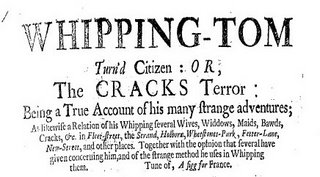
‘Whipping Tom’, the subject of a news pamphlet and this street ballad, made his way to
During his period of activity, he seems to have frightened the women of
The ballad, in representing Tom as ‘the Crack’s Terror’, assigns to him a particular class of victim, and therefore misrepresents the indiscriminate attacks he made. Like everything else in the ballad, the term ‘crack’ comes from the news pamphlet: ‘Another time as we are informed, he meeting with a demure Crack or Miss of the Town (who came to accost him) he so swinged her tail, that tis thought, she will not be capable of her Trade for some considerable time.’ A ‘Crack’, a 17th century idiom I’d missed (though it will surely be in Gordon Williams’s Dictionary of Sexual Slang and Imagery in Shakespeare and Stuart Literature) was a prostitute. But you can tell that the anecdote is spurious, written for the sake of a poor joke: compare these convincing specifics: ‘Another time the Woman that cries hot Gray Pease about the Streets, coming up Ram Alley in Fleet Street … a cold hand was lay’d upon her, and up flew her heels, and down fell the Pease Tub, when (as she has farther related) her sences were so charmed, that she lost all power of Resistance, and left him to Tyranize over her Posteriors at pleasure, the which when he had done, he left her to scrape up her ware as well as she could, for the use of such longing Ladies as are affected with such Diet.’
Shakespeare knew about these proclivities – there’s Cleopatra, the dominatrix of the imagination:
The oars were silver,
Which to the tune of flutes kept stroke, and made
The water which they beat to follow faster,
As amorous of their strokes…
The stupefied grey pea seller ambushed in Ram Alley, unable to resist, her senses charmed, letting Tom take his strange pleasure, seems a world away from Cleopatra, but trembles on the edge of Cleopatra’s assertion that ‘The stroke of death is as a lover’s pinch, / Which hurts, and is desir’d’. Her trade, in what I take to be salt-preserved peas, ministers to one of the other unaccountable longings of women.
Men dressed as woman went out on vigilante patrol, but Tom was never lured into a misplaced attack leading to his arrest. Aphra Behn mentions him in her play of 1682, The City Heiress ('and at last defeated, turn Whipping Tom, to revenge yourself on the whole sex'), there are a couple of other allusions, and then he slips back into the shadows, pioneer of a gaudy mass-produced pornographic fantasy.
I do not think I will look for any illustrative links for this one...
No comments:
Post a Comment